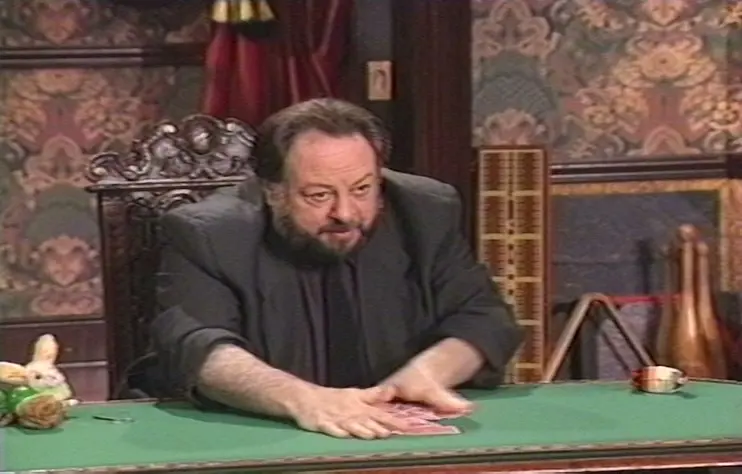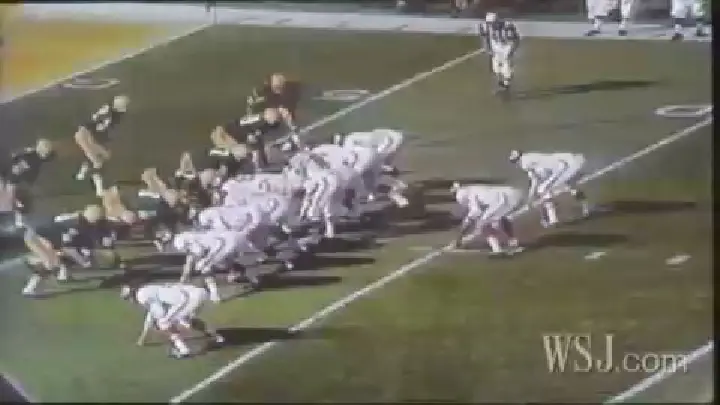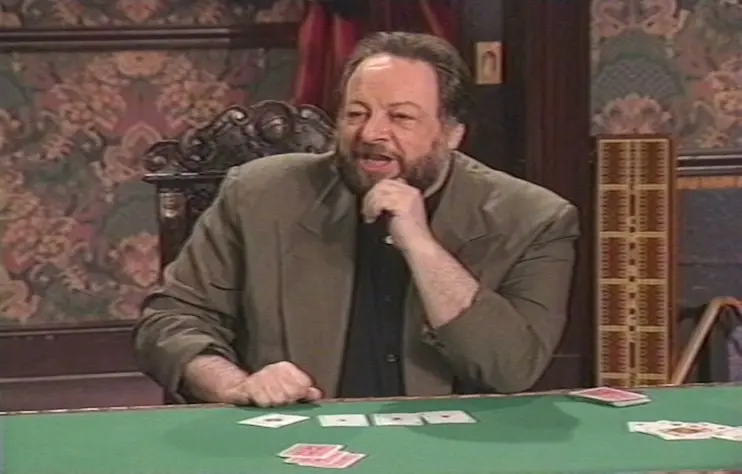This article originally appeared on February 17 at Defector, a worker-owned sports and culture website you should totally support.
HBO had a series of legendary stand-up specials in the 1990s, and one of the best of those came from a performer who was not a comedian. Ricky Jay and His 52 Assistants was incredibly funny, but Jay was a magician, although that seems not quite right. The press material for the special, which first aired on Dec. 17, 1996, called him an “illusionist.” That feels closer, but still not quite sufficient. The special, which was directed by Jay’s regular collaborator David Mamet, combined a number of astonishing card tricks with a breezily thorough recounting of the history of magic. That was more or less Ricky Jay's act; no one else has ever really done anything like it.
Ricky Jay, who died in 2018 at the age of 72, combined mastery of his craft with a thorough knowledge of its culture and lore. His 52 Assistants special was notable for his ability to throw playing cards into a watermelon and also his skill at explaining the long history of the cups-and-balls trick. You probably don’t need to be told not to get tricked into playing that by a hustler on the subway; Jay walks his audience through the long history of that hustle.
The special exists online in smudgy/greasy form, but it has never been released in a proper format. It deserves one—it deserves a remaster, a real streaming option, a version that is not in 480p, sourced from someone’s old VHS copy. Fortunately there are people who are obsessive about archiving media in the same way that Ricky Jay was about keeping alive the work of old-timey conjurers. One of those people is Chris Person, a contributor at Aftermath. He recently acquired and digitized the highest-quality copy of Jay’s special we have. It now also exists online.
I am not the only one who was giddy to watch this special. David Roth and I decided this was all cool enough to ask Person about how this all came about, and about the work of digitizing work that's otherwise on the verge of disappearing.

Dan: Chris, your work archiving media that might otherwise be lost is so admirable. How did you get involved in this kind of work?
Chris: It started by being a Chris Elliott fan and a guy who encodes video for a living. In the ’80s he did two specials: Action Family and FDR: A One Man Show. The idea of the former is that the exteriors are a shot-on-film police procedural like Columbo and all the interiors are a three-camera sitcom like The Brady Bunch. The latter is an extended parody of one-man shows. Both are online in absolute dogwater quality, so I dug deep and found the most advanced VHS archiving project around: VHS-Decode. You can read my entire writeup of it here because it’s complicated, but the short version is you solder wires into a VCR to extract as close to the raw tape signal as possible. From there, you are doing the decoding of the image in software. If you wanna see what a freakishly clean encode upscaled to 4K looks like on a tape from 1987 of The Cure on the BBC, check this shit out:
From there, I would just compulsively buy stuff that had no good encode. VHS and Laserdisc tends to be a pretty big blind spot for a lot of people who archive media. If you do this enough, eventually people will come to you. Eventually, I was approached by John Hand of Pulsing Cinema, who found a production dub of Ricky Jay in an eBay auction of a bunch of random HBO tapes. I got to work, and now we have a copy on Archive.org that doesn’t suck.
Dan: I have a tangential reasoning. When I was eight, we went to my uncle’s house to watch the WWF Royal Rumble. Just before the end of the match, Sid Vicious eliminates Hulk Hogan, and the crowd kind of cheered. I was eight and even I was kind of sick of Hogan’s shtick by then, too, and I may have cheered along as bad guy Ric Flair won the match. The next week on TV, they’d dubbed the crowd booing, and had the announcers re-record their commentary to make it sufficiently pro-Hogan. I’d turn nine the next day, and I think that was the day I began caring about saving media so the past can’t be altered, even if it’s something as stupid as the end of the 1992 Royal Rumble. I mean, to be fair, that is possibly the greatest wrestling match of all time.
David: It’s all scripted, you know.
Dan: Fortunately for me, wrestling fans did not mind its scripted nature. Also, they were and are obsessive. They recorded shows, they traded tapes, and nowadays there are incredible databases of things that WWF would really like you to have forgotten. There are episodes of ECW with the original music, back before anyone seemed to care about getting the rights to anything. There are recorded segments from Backstage Blast, a disaster of a segment during WCW Nitro commercial breaks. When the WWE Network came out, suddenly there were pristine copies of tons of shows. But not all of them were what really aired. The interview where Gabriel Byrne cuts a promo in character as Satan from End of Days is missing, for one thing. These kinds of clips—the weird, the offensive, the actually edgy—have been saved for all time by fans. This is true for sports, too.
Much of my library of Philadelphia sports games has simply come from YouTube downloads over the years. And now I am at the point where I have so much, I simply need higher-quality versions of old stuff. I have Super Bowl 52 in basically every format imaginable. I now need a high-quality version of the Fog Bowl so I can see how it really was.

David: Probably the only real journalistic achievement of my career came back when I was freelancing for The Wall Street Journal, and a guy emailed me to tell me that his father had a recording of Super Bowl I, which was for many years thought to be lost—not just because no one was sure anyone actually cared about the NFL back then, but because networks would just tape over stuff as a matter of course. This guy’s dad worked at a TV station and recorded it manually on a reel-to-reel, first with the commercials included and then as the game went on by pausing before the breaks and unpausing after—I have to assume he was the first person ever to do that.
That recording is at the Paley Museum of TV in Manhattan, and I watched it and wrote about it for the paper; I split the byline with a staffer because my editor at the time, who was “familiar with my shit,” wasn’t sure I could land it on my own, which at the time was probably correct. This was in 2011, so long enough ago that there was still this sense that the internet might someday contain everything that had ever existed—maybe with ads making it viable, maybe just through The Magic Of Free Speech or whatever. Obviously the internet has shrunk a great deal since then, and feels like it’s shrinking more by the day. This makes me more curious about the community of people doing this archiving. Who are these people? And Chris, I know you’re a movie head from when we used to talk about stuff back in our coworker days, but what is it that made you want to start doing this?
Chris: Aside from the aforementioned love of Chris Elliott specials, it’s a combination of my background as a video editor (I have had to deal with a lot of very badly handled footage in my life) and the sheer joy I feel every time I see that someone has uploaded an entire home recorded tape from 1986 with all the commercials. When I grew up, I experienced a lot of anime through fansubbed tapes and so I have a real love of those communities, because it’s overwhelmingly just volunteers. The motto “Keep Circulating the Tapes” that appears at the end of early episodes of MST3K was burned into me forever, and I think it’s something that needs to be taught to every subsequent generation.
Once people know you have a setup for this stuff, the tapes tend to find you. That’s how the Ricky Jay tape came to me, how someone spotted a rare tape from Yukio Ninagawa's Medea, how someone sent me a laserdisc of the Daicon IV intro. It’s something I can do in my spare time while I work. A24 sent me David Byrne’s copy of Stop Making Sense to capture, and that appears in the collector’s edition. I have an analog capture station on my desk and my laptop hums along doing the encoding in the background. It’s soothing.
You’d also be surprised how low the monetary barrier is to saving something sometimes. It requires skill to do it, but there are some tapes you’d assume were totally lost, and when you look them up they cost $30 to $100. It takes a while to learn how to encode and capture things properly, but once you do it’s not that difficult.
Dan: Yeah, after seeing your work on Ricky Jay, I now have about 20 VHS tapes I want to acquire and digitize in high quality. I even sent you a VHS copy of the Philadelphia Eagles rap “Buddy’s Watchin’ You” for my story, and now a perfect copy of it exists online. I am at a point where I am going to have to follow along with the things you’ve written about it and make a little setup myself. I have recorded media from my cable setup! I have even previously used the program you use, VHS Decode! I can do this! My brain, not to mention my wife, will surely be happy that I am thinking about a new project when several others are not finished! The basement can wait, I swear! Maybe I can put the whole setup down there!
More seriously and less exclamation-pointy, there’s something here that really seems important in the age of projects simply being shelved and thrown into a vault. It’s not that I needed to see Coyote vs. Acme, but the idea that a project might never see the light of day for financial reasons just makes me want to have amateurs digitize everything. Obviously that movie was never out there, but there’s a huge amount of media that is—and, due to various real or fake reasons, is never going to get a proper release. Is it important that there are Muppet Babies episodes online that have the original movie parodies and footage? It’s not the most important thing, but it’s good people can see how things originally aired.
David: I am broadly in favor of Saving Everything, with commercials if possible, partially on the principle that people put some portion of their lives into making all this stuff and it seems rude and reckless to just leave it on the curb, but also because I feel like there’s a lot about the texture and tone of a moment that can be read from even your bummier and more boring cultural products, or just from the jarringly horny ads for Big Red gum that aired during them. But that’s not quite what we’re talking about here.
I guess, looking back at it, that Ricky Jay and His 52 Assistants is a very ’90s cultural product. Jay looked the same pretty much for the entire time he was famous—the lapels widened and shrunk, but he was mostly this bearish, masterful, patter-intensive presence even during his late-night appearances in the ‘80s, and in every movie he was in, and presumably in the time he spent in the actual gambler/hustler demimonde that he apparently inhabited even as he became of America’s better-known doers of magic. But for all the ways the aesthetics of the audience and the staging mark the special as all that, it is also, to me, totally delightful and amazing. I have watched the deep-fried versions of this on YouTube as a stoned wind-down or just for pleasure for many years now. It was cool to see it looking crisp and contiguous and possibly even better than it did when it aired nearly 30 years ago. Chris, what led you to take this particular one on? Are you a member of the Ricky Jay Brotherhood as well?

Chris: I knew Ricky Jay, but I actually came to him fairly late. As with most of these things, you would be surprised how often to posting “Man, I sure would love to see a nice rip of this” which frequently bears fruit. Someone just sent me a LaserDisc I was looking for because I posted about it! I try to make a mental note of which things have decent transfers and which don’t, and this is one of them. Like, for example, Learned Pigs and Fireproof Women, an earlier TV special he did based on his book of the same name; it was directed by Michael Lindsay-Hogg, who you may know if you’re a huge Beatles fan. I also really enjoy the documentary about him, Deceptive Practice: The Mysteries and Mentors of Ricky Jay. It has very high-quality clips from 52 Assistants in there and clips that don’t appear on TV (I believe those are shot on film), but it also gives you stunning insight into his upbringing and his tough relationship with his family. He knew magic guys since he was a child, it’s in his blood.
David: Watching videos of Jay and sometimes my late namesake, the startlingly elfin coin magic legend David Roth, has long been a don’t-want-to-go-to-bed-yet pastime of mine. I’m not sure I can explain it, and given the radical honesty about nerdwad pursuits in here already I don’t imagine I have to, but part of the appeal for me is the sense that these are people with a craft, doing a thing they’ve done so many times that it looks and feels and sounds perfect. Obviously it’s fun to be tricked and wowed and all that, but I like that you can see all that work; part of the fun for me, where Jay is concerned, is in him kind of happily running up the score on the audience because he knows so much and can do so much that he can afford to have fun with it and mess with everyone.
But obviously that performance comes from someplace beyond repetition, that sort of weird milieu and Magic Guys and all that. The idea that it’s going to be on the people who care about this stuff to preserve it—to learn how to do that as you have, and to put each other onto stuff, and then to put it where people can enjoy it—really resonates with me right now. Obviously the interests that produced all this stuff are fine letting a lot of it die once it stops making them money. It seems important that they not get the last word on that.
Chris: Preservation is an act of collective willpower and effort. It cannot just be one person. I don’t want to live in a world where the things I love actually disappear.
Dan: Even things I hate… sometimes I’ll save ’em too. I do have all of the Eagles’ Super Bowl losses.

